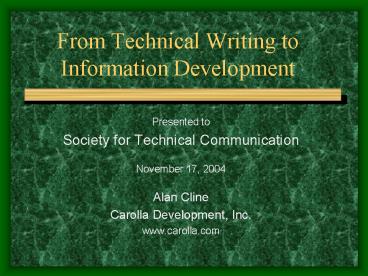From Technical Writing to Information Development - PowerPoint PPT Presentation
1 / 27
Title:
From Technical Writing to Information Development
Description:
Project initiation needs objective facilitation ... Facilitation: JAD and requirements collection, use case prioritization, Delphi consensus ... – PowerPoint PPT presentation
Number of Views:59
Avg rating:3.0/5.0
Title: From Technical Writing to Information Development
1
From Technical Writing to Information Development
- Presented to
- Society for Technical Communication
- November 17, 2004
- Alan Cline
- Carolla Development, Inc.
- www.carolla.com
2
Agenda
- Who is Carolla Development?
- From Technical Writing to Information Development
- Information Domains and Technical Writers
- Sample Domain Requirements Elicitation
- Problems with Requirements collection
- Techniques for Requirements collection
- Sample documents
- Standard Tools (de facto) Used.
3
Who is Carolla Development?
- Process engineering for software development
- Project management, requirements collection
- Technical writing is crucial to good software
development - Tech writers need to expand skills to new market
needs and technologies - Carolla trains technical writers to be info
developers (business analysts).
4
- This is not your
- Remington typewriters
- profession anymore.
5
Technical Writing as It Was
- Major output documentation culled from
development or operations team - Procedures and standards manuals
- Operations manuals and run-books
- User manuals that get quickly out-of-date as
application changes - Primary tool word processor
- Contribution to development process rare or
after-the-fact.
6
But
- Printed manuals for applications are being
replaced with online help - Web pages, HTML and XML are prolific for content,
databases, and programming - Interactive graphics and sound replacing static
hardcopy artifacts - Technologies providing new tools and new skills
- Simple data repositories being replaced by more
holistic knowledge management.
7
Information Development as It is Becoming
- Business needs driving better development
- Better development requires better requirements
and better QA - Offshore outsourcing driving stand-alone
(encapsulated) requirements - Better artifacts needed during development, not
after, that can drive information flow - Clear, unambiguous, and objective writing needed
for business reqments (use cases) - Modeling artifacts are becoming vogue.
8
Information Domains
- Best-practice development uses successive
knowledge refinement (risk curve)
9
(No Transcript)
10
Information Domains
- Best-practice development uses successive
knowledge refinement (risk curve) - Project initiation needs objective facilitation
- Requirements processes need clarity and
disambiguation to build good specs - QA processes, e.g., technical reviews, need
objective documenters perspective and
facilitation.
11
Why Tech Writers Make Good Information Developers
- Experts in communicating clearly and
unambiguously - Experienced at learning, analysis, and
re-explaining new concepts - Experienced at learning new tools quickly
- Can provide objective view as part of development
or QA team - If people-oriented, can provide independent
facilitation skills - Foreign values from foreign cultures.
12
Sample Domain Requirements Elicitation
- The greatest source of (and impact on) product
defects
13
(No Transcript)
14
Sample Domain Requirements Elicitation
- The greatest source of (and impact on) product
defects - Customers often dont know or cant express what
they want (context-dependency)
15
(No Transcript)
16
(No Transcript)
17
Sample Domain Requirements Elicitation
- The greatest source of (and impact on) product
defects - Customers often dont know or cant express what
they want (face-of-the-cow dependency) - Customers (subjective) expectations and
perspectives bias success and absolute meaning
(blind men dependency)
18
(No Transcript)
19
Sample Domain Requirements Elicitation --
continued
- Requirements are often collected non-rigorously
and without validation - Requirements often collected by solution-oriented
thinkers yielding premature designs
(solution-fixation) - Requirements are written poorly and in an
ambiguous mediumnatural language
20
Ambiguity as Major Problem with Specifications
- TIME FLIES LIKE AN ARROW.
21
Sample Techniques For Requirements Collection
- Project Initiation Business Abstracts and
Project Abstract - IEEE Specifications and Use Cases
22
(No Transcript)
23
Use Cases
- Are user transactions or scenarios that define
how the user interacts with the system - Contain non-design-centered business rules of the
problem domain in rigorous structured English - Define a unit of work for predictable time and
effort estimates - Are easily validated for completeness and
correctness with business models - Drives design, test cases, and user documentation
- Sample use case (ATM withdraw transaction).
24
Sample Techniques For Requirements Collection
- Project Initiation Business Abstracts and
Project Abstract - Use cases and IEEE Specifications
- Facilitation JAD and requirements collection,
use case prioritization, Delphi consensus - QA formal technical reviews, independent
perspective (5x5 model) - Elephant model Managers, developers, testers,
customers, and documenters.
25
Tools
- RoboHelp for online help integrated into
applications - DreamWeaver and Macromedia Flash for
sophisticated multi-media webpage development - MS Front Page for HTML, and XML editors
- Visio or Framemaker for graphics (modeling
artifacts) - Version control tools (CVS) for managing project
documents - Beware A fool with a tool is still a fool.
26
- QUESTIONS?
- acline_at_carolla.com
- www.carolla.com
27
Develop the Project Abstract
- Merge stakeholders descriptions (business
abstracts) into a single statement - Define project mission with the executive goal
- Define project responsibilities as success
criteria - May contain time and cost estimate from the
project manager - Sample business and project abstract.































